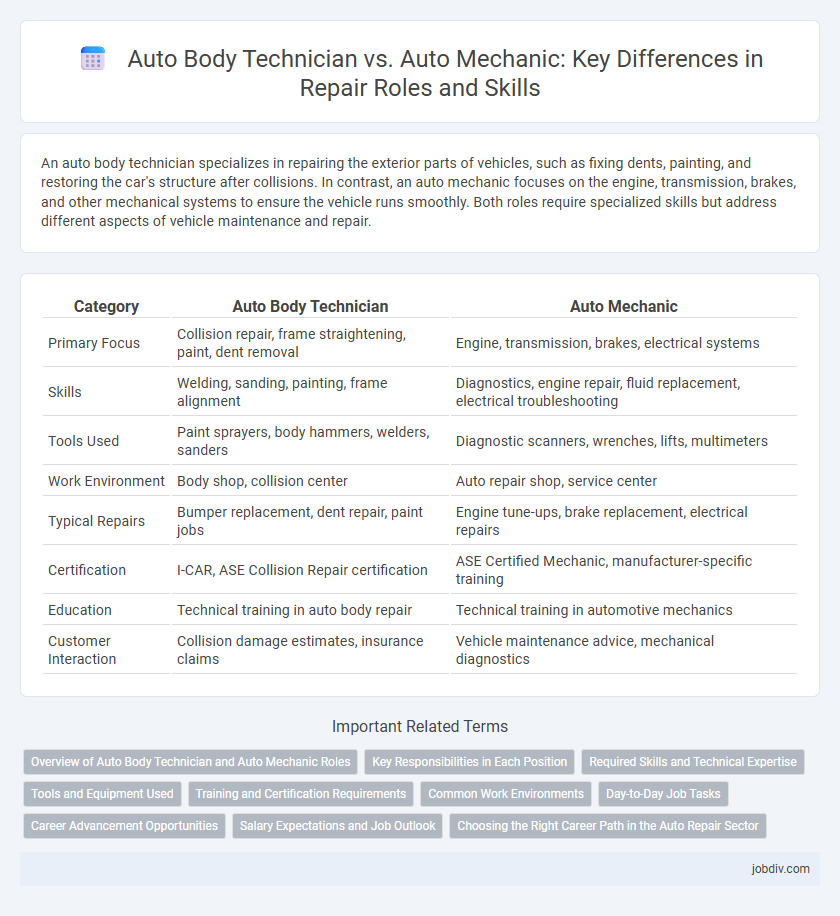An auto body technician specializes in repairing the exterior parts of vehicles, such as fixing dents, painting, and restoring the car's structure after collisions. In contrast, an auto mechanic focuses on the engine, transmission, brakes, and other mechanical systems to ensure the vehicle runs smoothly. Both roles require specialized skills but address different aspects of vehicle maintenance and repair.
Table of Comparison
| Category | Auto Body Technician | Auto Mechanic |
|---|---|---|
| Primary Focus | Collision repair, frame straightening, paint, dent removal | Engine, transmission, brakes, electrical systems |
| Skills | Welding, sanding, painting, frame alignment | Diagnostics, engine repair, fluid replacement, electrical troubleshooting |
| Tools Used | Paint sprayers, body hammers, welders, sanders | Diagnostic scanners, wrenches, lifts, multimeters |
| Work Environment | Body shop, collision center | Auto repair shop, service center |
| Typical Repairs | Bumper replacement, dent repair, paint jobs | Engine tune-ups, brake replacement, electrical repairs |
| Certification | I-CAR, ASE Collision Repair certification | ASE Certified Mechanic, manufacturer-specific training |
| Education | Technical training in auto body repair | Technical training in automotive mechanics |
| Customer Interaction | Collision damage estimates, insurance claims | Vehicle maintenance advice, mechanical diagnostics |
Overview of Auto Body Technician and Auto Mechanic Roles
Auto Body Technicians specialize in repairing and restoring vehicle exteriors, including fixing dents, replacing panels, and refinishing surfaces to ensure cosmetic and structural integrity. Auto Mechanics focus on diagnosing and repairing mechanical and electrical systems such as engines, transmissions, brakes, and suspension components. Both roles require technical skills and knowledge, but Auto Body Technicians emphasize aesthetic and bodywork restoration while Auto Mechanics concentrate on operational performance and mechanical functionality.
Key Responsibilities in Each Position
Auto Body Technicians specialize in repairing vehicle exteriors, including dent removal, frame straightening, and repainting to restore structural integrity and aesthetics. Auto Mechanics focus on diagnosing and repairing mechanical issues such as engine performance, brake systems, transmissions, and electrical components. Both roles require technical expertise but differ in their concentration on either the vehicle's body or its mechanical systems.
Required Skills and Technical Expertise
Auto body technicians specialize in repairing and restoring vehicle exteriors, requiring skills in welding, paint matching, and structural damage assessment. Auto mechanics focus on diagnosing and fixing engine, transmission, and electrical system issues, demanding expertise in mechanical systems, computer diagnostics, and engine repair. Both roles require precision, but their technical knowledge diverges significantly, with body technicians emphasizing cosmetic and structural integrity and mechanics targeting functional performance.
Tools and Equipment Used
Auto Body Technicians primarily use tools like spray guns, sanding blocks, frame straightening machines, and welding equipment to repair vehicle exteriors and restore structural integrity. Auto Mechanics rely on diagnostic scanners, pneumatic wrenches, engine hoists, and computerized alignment systems to troubleshoot and repair engine, transmission, and other mechanical systems. Both professions require specialized equipment tailored to their focus areas, with auto body work emphasizing surface refinishing and structural repair, while mechanics concentrate on mechanical functionality and performance optimization.
Training and Certification Requirements
Auto Body Technicians typically require specialized training in collision repair and refinishing, often obtained through vocational schools or community college programs, with certifications like I-CAR or ASE Collision Repair Technician enhancing their credentials. Auto Mechanics focus on engine, transmission, and other mechanical systems, usually earning ASE certifications in areas such as engine repair, brakes, and electrical systems after completing automotive technology programs. Both roles demand hands-on experience and updated knowledge of industry standards to ensure vehicle safety and performance during repair.
Common Work Environments
Auto Body Technicians typically work in collision repair shops where they focus on restoring vehicle exteriors, including frame straightening and paint matching. Auto Mechanics are commonly found in general automotive repair shops, dealing with engine diagnostics, brake repairs, and drivetrain maintenance. Both professionals operate in environments requiring the use of specialized tools, safety measures, and close attention to detail to ensure vehicle safety and performance.
Day-to-Day Job Tasks
Auto Body Technicians specialize in repairing vehicle exteriors, focusing on tasks such as dent removal, frame straightening, and repainting to restore the car's appearance after collisions. Auto Mechanics handle the mechanical systems under the hood, performing diagnostics, engine repairs, brake replacements, and routine maintenance to ensure optimal vehicle performance. While both roles contribute to vehicle repair, Auto Body Technicians address cosmetic and structural damage, whereas Auto Mechanics focus on mechanical functionality and system integrity.
Career Advancement Opportunities
Auto body technicians typically advance by specializing in collision repair, paint technology, or estimating insurance claims, often progressing to supervisory or shop management roles. Auto mechanics focus on engine diagnostics, electrical systems, and drivetrain repairs, with career growth leading to master technician status, dealership service manager, or technical training instructor positions. Both careers benefit from certification programs such as I-CAR for body technicians and ASE for mechanics, enhancing employment prospects and salary potential.
Salary Expectations and Job Outlook
Auto Body Technicians typically earn a median annual salary of $45,000, focusing on vehicle exterior repairs and paintwork, while Auto Mechanics average around $44,000, specializing in engine and mechanical system diagnostics. Job outlook for Auto Mechanics is projected to grow 5% over the next decade due to increasing vehicle complexity, whereas demand for Auto Body Technicians is expected to rise 8%, driven by increased collision repair needs. Both roles require technical expertise, but Auto Body Technicians often benefit from higher pay in regions with frequent weather-related vehicle damage.
Choosing the Right Career Path in the Auto Repair Sector
Auto body technicians specialize in repairing and restoring vehicle exteriors, focusing on collision damage, frame alignment, and paintwork, while auto mechanics diagnose and fix engine, transmission, and electrical system issues. Selecting the right career path depends on an individual's interest in either hands-on cosmetic restoration or mechanical problem-solving within the auto repair sector. Considering skills, training requirements, and job market demand can help determine whether a career as an auto body technician or auto mechanic aligns better with professional goals.
Auto Body Technician vs Auto Mechanic Infographic

 jobdiv.com
jobdiv.com